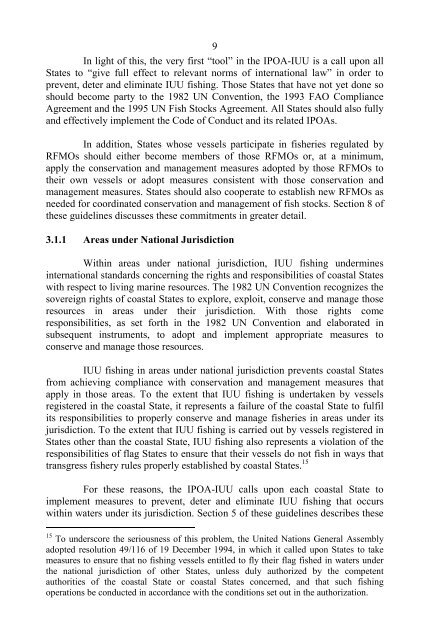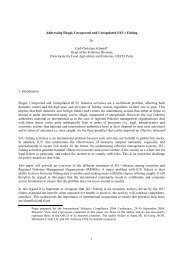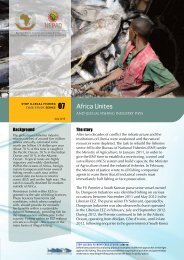Implementation of IPOA/IUU - International MCS Network
Implementation of IPOA/IUU - International MCS Network
Implementation of IPOA/IUU - International MCS Network
Create successful ePaper yourself
Turn your PDF publications into a flip-book with our unique Google optimized e-Paper software.
9In light <strong>of</strong> this, the very first “tool” in the <strong>IPOA</strong>-<strong>IUU</strong> is a call upon allStates to “give full effect to relevant norms <strong>of</strong> international law” in order toprevent, deter and eliminate <strong>IUU</strong> fishing. Those States that have not yet done soshould become party to the 1982 UN Convention, the 1993 FAO ComplianceAgreement and the 1995 UN Fish Stocks Agreement. All States should also fullyand effectively implement the Code <strong>of</strong> Conduct and its related <strong>IPOA</strong>s.In addition, States whose vessels participate in fisheries regulated byRFMOs should either become members <strong>of</strong> those RFMOs or, at a minimum,apply the conservation and management measures adopted by those RFMOs totheir own vessels or adopt measures consistent with those conservation andmanagement measures. States should also cooperate to establish new RFMOs asneeded for coordinated conservation and management <strong>of</strong> fish stocks. Section 8 <strong>of</strong>these guidelines discusses these commitments in greater detail.3.1.1 Areas under National JurisdictionWithin areas under national jurisdiction, <strong>IUU</strong> fishing underminesinternational standards concerning the rights and responsibilities <strong>of</strong> coastal Stateswith respect to living marine resources. The 1982 UN Convention recognizes thesovereign rights <strong>of</strong> coastal States to explore, exploit, conserve and manage thoseresources in areas under their jurisdiction. With those rights comeresponsibilities, as set forth in the 1982 UN Convention and elaborated insubsequent instruments, to adopt and implement appropriate measures toconserve and manage those resources.<strong>IUU</strong> fishing in areas under national jurisdiction prevents coastal Statesfrom achieving compliance with conservation and management measures thatapply in those areas. To the extent that <strong>IUU</strong> fishing is undertaken by vesselsregistered in the coastal State, it represents a failure <strong>of</strong> the coastal State to fulfilits responsibilities to properly conserve and manage fisheries in areas under itsjurisdiction. To the extent that <strong>IUU</strong> fishing is carried out by vessels registered inStates other than the coastal State, <strong>IUU</strong> fishing also represents a violation <strong>of</strong> theresponsibilities <strong>of</strong> flag States to ensure that their vessels do not fish in ways thattransgress fishery rules properly established by coastal States. 15For these reasons, the <strong>IPOA</strong>-<strong>IUU</strong> calls upon each coastal State toimplement measures to prevent, deter and eliminate <strong>IUU</strong> fishing that occurswithin waters under its jurisdiction. Section 5 <strong>of</strong> these guidelines describes these15 To underscore the seriousness <strong>of</strong> this problem, the United Nations General Assemblyadopted resolution 49/116 <strong>of</strong> 19 December 1994, in which it called upon States to takemeasures to ensure that no fishing vessels entitled to fly their flag fished in waters underthe national jurisdiction <strong>of</strong> other States, unless duly authorized by the competentauthorities <strong>of</strong> the coastal State or coastal States concerned, and that such fishingoperations be conducted in accordance with the conditions set out in the authorization.
















